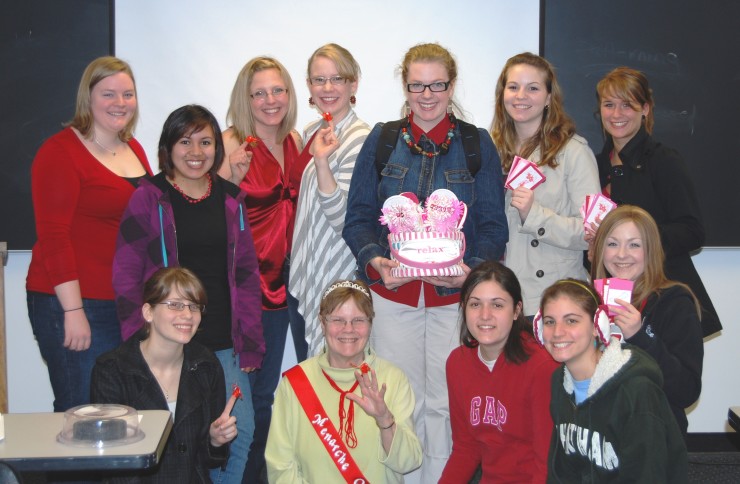Margaret L. (Peggy) Stubbs, Professor Emerita of Psychology, Chatham University, Pittsburgh PA
When and/or why did you join the Society for Menstrual Cycle Research?
I’ve been a member of the Society since 1981 when I attended my first conference. I learned about the SMCR after I decided that my dissertation topic would address menstruation.
How did you become interested in doing menstrual cycle research?
Before going back to school to get my PhD, I was fortunate to be able to teach in an alternative school in Cambridge, MA. This was an eye opening experience in many ways—not the least of which involved what happened when the girls in my 6th – 8th grade classroom got their periods. They came to school and announced this, freely and joyfully, to our co-ed class!
This made me think about my own experience which was not celebratory but not at all dreadful. My mother, following what her friends were doing, gave me a little booklet, which I read, and some pads provided by a product manufacturer. To the best of my ability I tried to manage the paraphernalia. Back then, pads were fastened to a belt and a thin blue strip on one side indicated the bottom of the pad. This detail escaped me and for about a year and a half I wore the pad with the wrong side up, which was very uncomfortable. Eventually a friend’s older sister enlightened me in a very secretive conversation. How times have changed!
Sometime later, both my then-husband and my then-primary-health-care doctor attributed some of my sad feelings to my cycle, but this never seemed right to me. There is a great comment in The Search for Signs of Intelligent Life in the Universe, a play written by Jane Wagner and performed by Lily Tomlin,which went something like: “My husband cheated on me; I have two kids and no day care; I’m broke; my car died…and you think it’s PMS??” Not my circumstances then, but this perspective about my own situation rang more true to me.
When it came time to choose a dissertation topic, I decided to focus on the menstrual cycle, in part to make sense of my own experiences and those of my students. My initial literature search described menstruation as a debilitating, even pathological phenomenon. Empirical research derived largely from psychoanalytic theory or data collected with the Moos (1968) Menstrual Distress Questionnaire, a research instrument that made it difficult to demonstrate any positive aspects of menstruating.
Which researcher or paper influenced or inspired you to pursue research in this area? Why?
Against this discouraging view of the cycle, a new research approach was taking shape. Early research by Brooks-Gunn, Ruble, Parlee and Sommers which stressed a bio-psychosocial approach to the study of menstrual experience, captured my interest. I learned of two local researchers, Elissa Koff and Jill Rierdan, who introduced me to SMCR and were gracious enough to take me on as a research assistant in their work on early adolescent girls’ menstrual attitudes and experiences. These, and my first SMCR conference, were foundational relationship for me, both personally and professionally.
At that first conference and subsequent ones, established SMCR researchers like Ann Voda, Phyllis Mansfield, and Alice Dan welcomed me and mentored me. This group cares about encouraging one another to engage in rigorous research that accurately reflects menstrual experience. Our priority to mentor newcomers and one another is one of the things I treasure about SMCR.
What are the primary areas of your menstrual cycle research?
Although I am newly retired, I hope to use my time to continue with my own research and also with documenting SMCR history. I have long been interested in the relationship of menstrual attitudes to menstrual experience and care deeply about reducing menstruation stigma. Reducing menstruation stigma calls for a wider recognition of the importance of menstruation to general health and well-being and I am committed to promoting evidence-based menstrual education to menstruators of all ages.
Where can visitors to our blog read about your work on menstruation?
Mentioning menstruation: A stereotype threat that diminishes cognition?; Wister, J., Stubbs, M.L. & Shipman C. (2013); Sex Roles, 68(1-2), 19-31, January 2013
Menstrual Health Education: How and why to make it better with Evelina Sterling, Menstruation Matters blog, January 2016.
How has the field of menstrual cycle research changed since you entered this area?
When I began my work, both clinicians and health-care practitioners held a primarily negative view of menstrual experience, though of course, negative menstrual experience does exist for some. There is still work to be done to fully document and appreciate menstrual life and its relationship to health and well-being more broadly. Nevertheless, it is gratifying that the importance of menstruation is finally getting some positive press! It is also gratifying to see increased international dialogue among menstrual health advocates.
What else would you like our readers to know about the value, importance or influence of menstrual cycle research?
Menstrual cycle research promises to help people understand this aspect of healthy development as it occurs for themselves and the people they love. Research can prompt a reconsideration and hopefully a rejection of negative menstrual mythology that holds people back from realizing both individual and collective potential.
For information on becoming a member of the Society for Menstrual Cycle Research contact us by email: info@menstruationresearch.org. Subject line: Membership.


